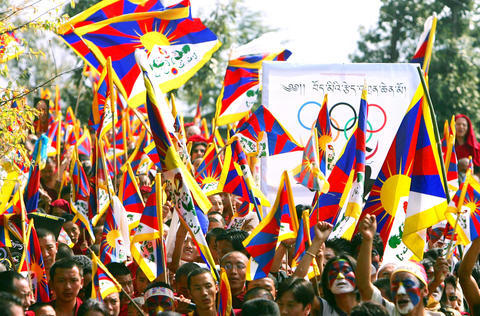The Dalai Lama attacked China's human rights record yesterday, accusing it of "unimaginable and gross violations" in his Himalayan homeland.
"Repression continues to increase with numerous, unimaginable and gross violations of human rights, denial of religious freedom and politicization of religious issues," he told hundreds of flag-waving supporters on the 49th anniversary of his escape to India after an abortive uprising in Lhasa.
The Nobel Peace Prize winner's angry comments came in a speech in the Indian town of Dharamsala and contrasted sharply with what his critics say has been a "soft" approach on China.

PHOTO: AFP
"For nearly six decades Tibetans have had to live in a state of constant fear under Chinese repression," he said.
"All these take place as a result of the Chinese government's lack of respect of the Tibetan people," the 72-year-old told the gathering from his palace in this seat of the Tibetan government-in-exile.
He also complained that Tibet's language, customs and traditions were "gradually fading away" as Tibetans become "an insignificant minority" in their homeland.
Tibetans "have had to live in a state of constant fear, intimidation and suspicion under Chinese repression," he said.
The Dalai Lama, however, said that he would not abandon his call for autonomy in Tibet even though six rounds of talks with the Chinese since 2002 have yielded little result.
"During the past few years, Tibet has witnessed increased repression and brutality. In spite of these unfortunate developments my stand and determination to pursue the `Middle-Way' policy remain unchanged," he said.
He also said August's Beijing Olympics could be a golden opportunity for the international community to expose China over its treatment of Tibetans.
"Besides sending their athletes, the international community should remind the Chinese government of these issues ... China should prove herself a good host by providing these freedoms," he said.
Yesterday also marked the start of a symbolic march home by 100 Tibetans as part of protests ahead of the Beijing Olympics. Several thousand Tibetans, Indians and Westerners waved yellow, blue and red Tibetan flags and cheered on the Buddhist monks in red caps and 10 women who said they planned to make it over the Chinese border.
Italian parliamentarian Sergio D'Elia flagged off the symbolic home trek: "It's the duty of every freedom-loving person to support this march.
The organizers refused to reveal where any attempt would be made to cross the border but said it could take up to six months to reach the Tibetan capital Lhasa.
Tibetan refugees across the world also protested yesterday.
In Nepal, many people were hurt when police used batons to break up a march by about 1,000 Tibetans on the Chinese embassy.
In Greece, a dozen Tibetans activists held a torch-lighting ceremony in Ancient Olympia. Police prevented the Tibetan group, Team Tibet, from entering the Ancient Olympia stadium, and the ceremony took place outside the gates of the site's museum. The group aims to have its Tibetan Freedom Torch Relay pass through 50 cities and end inside Tibet on Aug. 8.
Greek police stopped Tibetan shot-putter Tsultim Golpe as she began her run and took her torch, handing it back later with the flame extinguished. They then escorted the group back to their hotels in Olympia. Officials from China's Athens embassy were in Olympia, filming the ceremony.

SECURITY: As China is ‘reshaping’ Hong Kong’s population, Taiwan must raise the eligibility threshold for applications from Hong Kongers, Chiu Chui-cheng said When Hong Kong and Macau citizens apply for residency in Taiwan, it would be under a new category that includes a “national security observation period,” Mainland Affairs Council (MAC) Minister Chiu Chui-cheng (邱垂正) said yesterday. President William Lai (賴清德) on March 13 announced 17 strategies to counter China’s aggression toward Taiwan, including incorporating national security considerations into the review process for residency applications from Hong Kong and Macau citizens. The situation in Hong Kong is constantly changing, Chiu said to media yesterday on the sidelines of the Taipei Technology Run hosted by the Taipei Neihu Technology Park Development Association. With

CARROT AND STICK: While unrelenting in its military threats, China attracted nearly 40,000 Taiwanese to over 400 business events last year Nearly 40,000 Taiwanese last year joined industry events in China, such as conferences and trade fairs, supported by the Chinese government, a study showed yesterday, as Beijing ramps up a charm offensive toward Taipei alongside military pressure. China has long taken a carrot-and-stick approach to Taiwan, threatening it with the prospect of military action while reaching out to those it believes are amenable to Beijing’s point of view. Taiwanese security officials are wary of what they see as Beijing’s influence campaigns to sway public opinion after Taipei and Beijing gradually resumed travel links halted by the COVID-19 pandemic, but the scale of

A US Marine Corps regiment equipped with Naval Strike Missiles (NSM) is set to participate in the upcoming Balikatan 25 exercise in the Luzon Strait, marking the system’s first-ever deployment in the Philippines. US and Philippine officials have separately confirmed that the Navy Marine Expeditionary Ship Interdiction System (NMESIS) — the mobile launch platform for the Naval Strike Missile — would take part in the joint exercise. The missiles are being deployed to “a strategic first island chain chokepoint” in the waters between Taiwan proper and the Philippines, US-based Naval News reported. “The Luzon Strait and Bashi Channel represent a critical access

Pope Francis is be laid to rest on Saturday after lying in state for three days in St Peter’s Basilica, where the faithful are expected to flock to pay their respects to history’s first Latin American pontiff. The cardinals met yesterday in the Vatican’s synod hall to chart the next steps before a conclave begins to choose Francis’ successor, as condolences poured in from around the world. According to current norms, the conclave must begin between May 5 and 10. The cardinals set the funeral for Saturday at 10am in St Peter’s Square, to be celebrated by the dean of the College